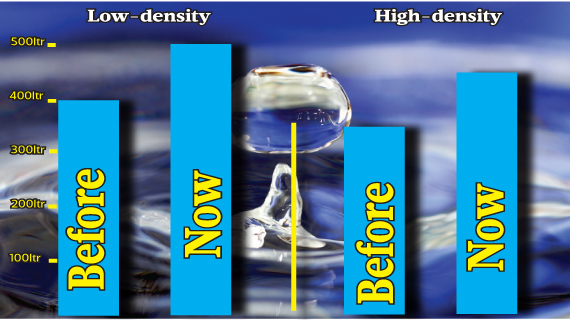
BULAWAYO City Council has reviewed upwards the daily water limits for residential and commercial properties and other institutions although some councillors felt such a move would negatively affect revenue collections. NQobile bhebhe CHIEF REPORTER

The decision was taken by the joint Finance and Development and Future Water Supplies and Water Action Committees this week after considering that there were significant inflows during the rainy season.
Earlier this year, council suspended water-shedding, but warned residents to use the resource sparingly.
Water rationing limits for high and low-density areas has been moved to 450 litres and 500ltr per day up from 350ltr and 400ltr per day respectively. The new levels were with effect from the beginning of May.
Finance committee chairperson James Sithole yesterday told Southern Eye that although the decision was good news for residents, council stood to lose out on finances. Before the review, council was charging penalties for exceeding daily limits.
“Water is a cash cow for council. We are charging penalties for people who exceed their allocations. But now the new limits are going to eat into our financial revenue streams,”he said.
“The number of properties that will exceed the limits is going to drop and so will the amount collected in terms of penalties.”
- Chamisa under fire over US$120K donation
- Mavhunga puts DeMbare into Chibuku quarterfinals
- Pension funds bet on Cabora Bassa oilfields
- Councils defy govt fire tender directive
Keep Reading
Sithole said in the long run council might struggle to provide water as it would be lacking funds to procure water treatment chemicals.
“We do have adequate water to last about three years, but what people should realise is that part of the funds used to buy treatment chemicals was from penalty charge. With the projected drop in cash collected we might fail to provide treated water,” he said.
Water limits were also increased for hotels, hospitals, clinics commercial consumers, schools, churches, institutions, sports clubs, police stations army barracks and prisons.
According to the latest council report, government schools were exceeding their allocations by as high as 496%, followed by eastern areas with 79% consumers not complying with their allocation compared to 11% in high-density suburbs resulting in the former incurring more surcharges.
The committee resolved that money raised from penalties be used to fund water augmentation and demand management projects with effect from 2015. Use of potable water for construction and connections to all vacant stands remains suspended.










